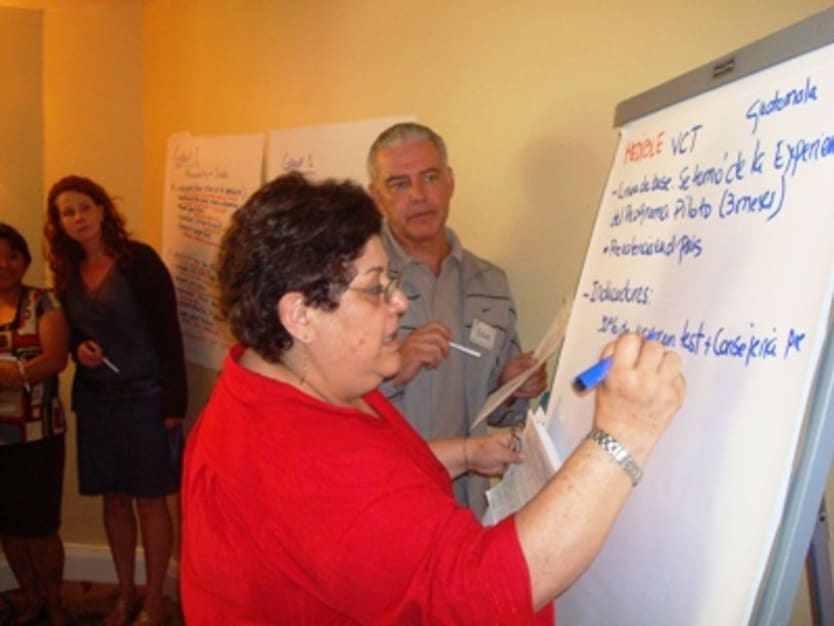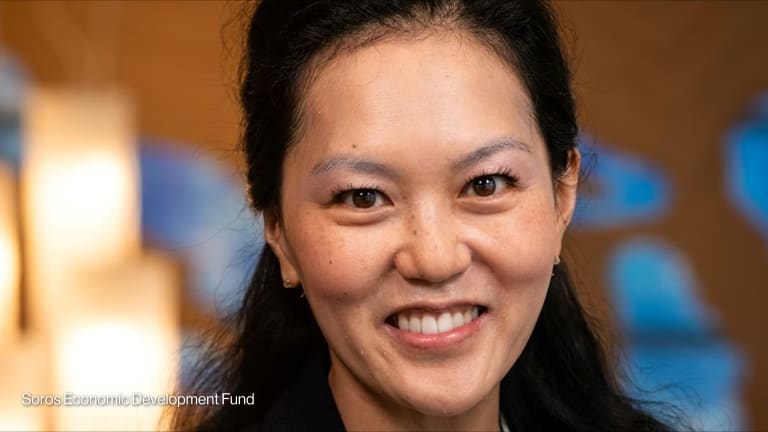
Pilar Sebastian thought Guatemala looked like part of the First World, with the capital’s malls and U.S. fast-food chains. But she realized that beyond Guatemala City, the country shares tragic realities with many African nations, including famine and chronic malnutrition that has killed hundreds of rural villagers.
Trained as a nurse, Sebastian has more than 20 years of experience in health service delivery, working in some of the world’s poorest nations. The Bolivian native worked in her homeland’s public health sector before joining Population Services International in 1999 as country representative for Nicaragua. She later transferred to PSI’s Mozambique program as a technical advisor before taking on the Guatemala country representative post in 2008.
Devex met with Sebastian at the PSI country program office in Guatemala City’s Zone 10 neighborhood, where she manages a staff of 45 local employees. In addition to describing the public health challenges facing the country, she discussed PSI’s programs in Guatemala and work with local health partners, as well as what she looks for in job candidates.
Public health trends in Guatemala
What are the current Guatemalan public health sector trends?
After coming from Africa I thought, “This is the First World.” All the fast food in the world is here. All the malls in the world are here. I thought this country is completely developed! Even Bolivia seemed much less developed than it is here. I didn’t see a lot that needed to be developed. I don’t know where the money comes from for so many fantastic malls.
But little by little, I found out that there is a big part of the country that lacks development, particularly in terms of developing leadership for women and maternal and child health. It is one of the countries with the highest child mortality rate and maternal mortality rate. It’s incredible that the chronic malnutrition is so bad that people are literally dying of hunger here.
In the public health sector, the people are badly paid, overburdened. There is no motivation. They don’t see a future, and so the patient gets treated badly and doesn’t [have access to public services].
We work a lot with family planning. Almost all the women in the country that we see don’t want to have as many children as they do. More than 40 percent want more family planning, but there is not enough use of birth control.
Religion is very powerful. A little while ago, there was a march where the bishop held up a bullet and said that abortion is the same as a bullet, that [a birth control] pill is the same as a bullet. They still think that an IUD is abortion.
PSI in Guatemala
What does PSI do specifically in Guatemala?
We have several projects. One is the distribution and sale of condoms throughout the country. We have two lines of condoms. One is commercial, and the other is through social marketing and is directed to high-risk populations: sex workers and gay men. This part of the work is to prevent HIV and STI [sexually transmitted infection]. They are not free, but they are very low-cost.
During our programs with sex workers, it was surprising to see many indigenous women that come from their villages to work as sex workers in the city every day. The family thinks they are doing housecleaning.
On the other side, we have a very new family planning project that is dedicated to promoting family planning methods. We are working to help the Ministry of Health with this work. We promote IUDs and implants.
We also do a lot of behavioral change communication. We have educators that work with at-risk groups, and we have a team that does voluntary testing and counseling for HIV tests.
We also have a very specific program with young people in order to prevent AIDS by providing sexual and reproductive education. We do that through peer education - and they are the ones that work in the schools - and we also have a program on the radio. One of the radio programs is based in Guatemala City, and the other one is targeted more for the indigenous community and includes general education, including how to read and write via radio.
In our family planning program, they are in a region where many of the indigenous don’t speak Spanish. So, in that region, some of our health promoters speak the local [indigenous] languages.
How does PSI work with local organizations in Guatemala?
We don’t have a written policy for how we do that. PSI works with local organizations because we can’t do it alone and because it’s part of our donors’ mission to facilitate capacity building.
There are partners like the Marco Antonio Foundation, which is very well-known. We’ve worked with them a long time. They are always the same, the large entities that work on these projects. For example, the Ministry of Health, their department in charge of fighting AIDS has many NGO partners that have international support. In other cases, we do our searches through word of mouth; we use our professional networks.
Sometimes, local organizations will also contact us. If we are interested, and they are interested, and there is compatibility, then we sign an agreement and we work together.
Ideal qualities of PSI Guatemala job candidates
You manage a fairly large staff of local hires. What do you look for in job candidates?
Degrees don’t impress me at all. It’s very in fashion now to have a master’s degree, and everybody has one. But I’ve been working with lots of people in lots of different areas, and I have an idea of what type of candidate I want to hire.
What matters for me is attitude. Of course, I am interested in someone’s knowledge. But I care more about their practical knowledge more than theoretical knowledge.
I want optimistic people, proactive people … creative people. Between a person that is supercapable with seven master’s degrees and someone less capable but who is going to add to a positive environment, who is extremely motivated and is going to engage in teamwork … I’m going to choose the latter. That counts a lot for me.
It may sound a bit strange, but I let myself make the judgment based more on my feelings. I’ve worked a lot with human resources, and I’ve developed a good intuition.
Search for articles
Most Read
- 1
- 2
- 3
- 4
- 5








